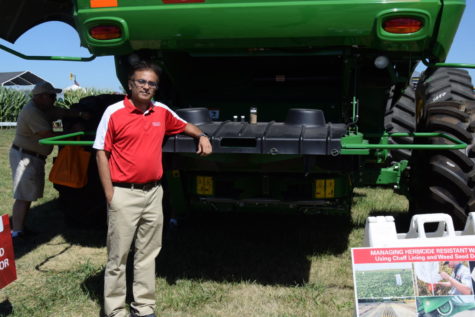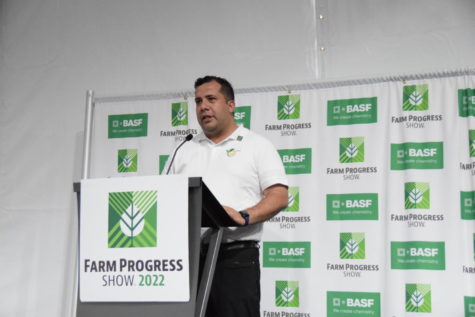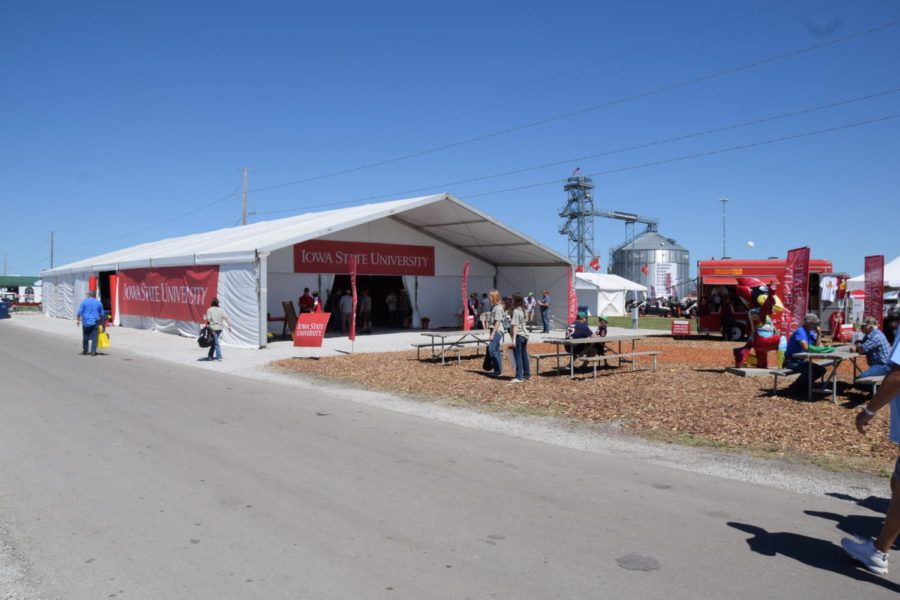Iowa State shares agricultural accomplishments at Farm Progress Show
Iowa State’s exhibit at the farm progress show was located towards the center of the 80-acre exhibit field.
Iowa State showcased its agricultural achievements and spread awareness on a variety of topics this week at the Farm Progress Show.
Iowa State’s exhibit mostly took place inside of a tent set up towards the center of the 80-acre exhibit field. They had informational booths set up on a number of topics, including carbon dioxide, weather and climate, monarch butterflies and water quality, to name a few.
“I think this is one of the best shows we’ve ever had,” said Kendall Lamkey, agronomy department chair and co-chair of the Farm Progress Show planning committee. “Attendance is good, I think our displays are outstanding and our people are doing a great job. There’s a lot of energy here; I’ve been real happy with the show.”
The audible chatter in the tent alone made it clear that visitors were engaged and interested in the tent’s various topics.
“It’s been surprising to us what people are interested in. All of our displays have been good; it’s been really cool,” Lamkey said. “Oddly enough, the Creamery people are selling ice cream like crazy.”
The ISU Creamery was only one of Iowa State’s attractions placed outside of the tent. Iowa State also had a combine attachment called the Weed Seed Destructor, which generated a lot of interest from visitors.

Prashant Jha, a professor in agronomy, was nearby showcasing the combine attachment and explaining its various uses. The attachment offers a mechanical alternative to the herbicides typically used to prevent weeds from spreading across fields.
The Weed Seed Destructor pulverizes the variety of weed seeds that pass through the combine, preventing them from germinating.
An Iowa State researcher was also included in a media event discussing a new soy-based asphalt. The technology was developed at Soylei Innovations after Iowa State researchers developed a soy-based polymer that can be used to replace a variety of petroleum-based materials.
Nacu Hernandez, a research scientist at Iowa State and CEO and co-founder of Soylei Innovations, first worked on the soy-based polymer during his time as a graduate student working with Eric Cochran, a professor in chemical and biological engineering at Iowa State.
Matt Jungmann, event director for the Farm Progress Show, said the technology was even put to use within the farm progress show’s varied industries tent. Historically a dusty and, at times, muddy exhibit, the varied industries tent is now paved with soy-based asphalt.
Hernandez happily reported that Soylei Innovation’s booth at the show was visited by Iowa’s Secretary of Agriculture, Mike Naig, who shared his excitement about the technologies Hernandez and his company are working on.

“You’re not only helping the environment by using this type of product, but you’re also helping the farmers get better value for their beans,” Hernandez said. “There’s a lot of benefits people are getting from this type of technology, so we really want to showcase this to the world; this has been an excellent opportunity for us to showcase this technology.”
The soy oil-based polymer goes beyond asphalt, having feasible applications in countless products and materials, according to Hernandez.
“We started right now just with asphalt materials, but this is something that can be applied to a lot of different technologies,” Hernandez said. “We want to start using it in tires; we want to start using it in disposable materials– this technology is so flexible that it can be applied to a lot of different products.”
The Farm Progress show is the nation’s largest agricultural event, featuring over 500 exhibitors and thousands of visitors. The show will continue through Thursday with more opportunities for people to engage with agricultural businesses and organizations.
Your donation will support the student journalists of the Iowa State Daily. Your contribution will allow us to purchase equipment, send our student journalists to conferences and off-set their cost of living so they can continue to do best-in-the-nation work at the Iowa State Daily.












